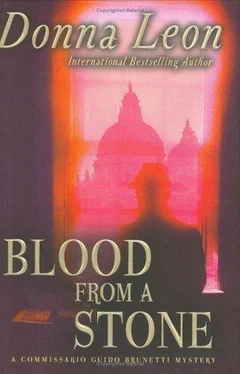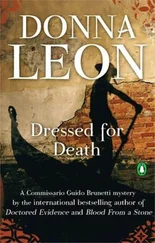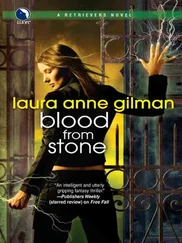Donna Leon - Blood from a stone
Здесь есть возможность читать онлайн «Donna Leon - Blood from a stone» весь текст электронной книги совершенно бесплатно (целиком полную версию без сокращений). В некоторых случаях можно слушать аудио, скачать через торрент в формате fb2 и присутствует краткое содержание. Год выпуска: 2005, Жанр: Детектив, на русском языке. Описание произведения, (предисловие) а так же отзывы посетителей доступны на портале библиотеки ЛибКат.
- Название:Blood from a stone
- Автор:
- Жанр:
- Год:2005
- ISBN:нет данных
- Рейтинг книги:4 / 5. Голосов: 1
-
Избранное:Добавить в избранное
- Отзывы:
-
Ваша оценка:
- 80
- 1
- 2
- 3
- 4
- 5
Blood from a stone: краткое содержание, описание и аннотация
Предлагаем к чтению аннотацию, описание, краткое содержание или предисловие (зависит от того, что написал сам автор книги «Blood from a stone»). Если вы не нашли необходимую информацию о книге — напишите в комментариях, мы постараемся отыскать её.
Blood from a stone — читать онлайн бесплатно полную книгу (весь текст) целиком
Ниже представлен текст книги, разбитый по страницам. Система сохранения места последней прочитанной страницы, позволяет с удобством читать онлайн бесплатно книгу «Blood from a stone», без необходимости каждый раз заново искать на чём Вы остановились. Поставьте закладку, и сможете в любой момент перейти на страницу, на которой закончили чтение.
Интервал:
Закладка:
A man at the back peeled himself away and started across the campo . Brunetti made no effort to stop him. As he stood there, the others dissolved until there was just one person left, an old woman who held herself upright only with the help of two canes. He knew her by sight, though she was usually in the company of two mangy old dogs. She balanced her right cane against her hip and beckoned him towards her. As he approached, he saw the wrinkled face, the dark eyes, the white bristles on her chin.
‘Yes, Signora?’ he asked. ‘Did you see something?’ Without thinking, he addressed her in Veneziano rather than Italian.
‘There were some Americans here when it happened.’
‘How did you know they were Americans, Signora?’ he asked.
‘They had white shoes and they were very loud,’ she answered.
‘When it happened?’ he insisted. ‘Were you here? Did you see?’
She took her right cane and lifted it to point in the direction of the pharmacy on the corner, about twenty metres away. ‘No, I was over there. Just coming in. I saw them, the Americans. They were walking this way, from the bridge, and then they all stopped to look at the stuff the vu cumprà had.’
‘And you, Signora?’
She moved her cane a few millimetres to the left. ‘I went into the bar.’
‘How long were you in there, Signora?’
‘Long enough.’
‘Long enough for what?’ he asked, smiling at her, not at all annoyed by her oblique answer.
‘Barbara, the owner, after about eight, she takes all the tramezzini that haven’t been sold, and she cuts them up into little pieces and puts them on the counter. If you buy a drink, you can eat all you want.’
This surprised Brunetti, unaccustomed as he was to such generosity from the owners of bars; from the owners of anything, for that matter.
‘She’s a good girl, Barbara,’ the old woman said. ‘I knew her mother.’
‘So how long do you think you were in there, Signora?’ he asked.
‘Maybe half an hour,’ she answered, then explained, ‘It’s my dinner, you see. I go there every night.’
‘Good to know, Signora. I’ll remember that if I’m ever over here.’
‘You’re over here now,’ she said, and when he didn’t respond, she went on: ‘The Americans, they went in there. Well, two of them did,’ she added, lifting the cane again and pointing at the bar.
‘They’re in the back, having hot chocolate. You could probably talk to them if you wanted to,’ she said.
‘Thank you, Signora,’ he said and turned towards the bar.
‘The prosciutto and carciofi is the best,’ she called after him.
3
Brunetti hadn’t been in the bar for years, ever since the brief period when it had been converted into an American ice-cream parlour and had begun to serve an ice-cream so rich it had caused him a serious bout of indigestion the one time he had eaten it. It had been, he recalled, like eating lard, though not the salty lard he remembered from his childhood, tossed in to give taste and substance to a pot of beans or lentil soup, but lard as lard would be if sugar and strawberries were added to it.
His fellow Venetians must have responded in similar fashion, for the place had changed ownership after a few years, but Brunetti had never been back. The tubs of ice-cream were gone now, and it had reverted to looking like an Italian bar. A number of people stood at the curved counter, talking animatedly and turning often to point out at the now-quiet campo ; some sat at small tables that led into the back room. Three women stood behind the bar; one of them, seeing Brunetti enter, offered him a friendly smile. He walked towards the back and saw an elderly couple at the last table on the left. They had to be Americans. They might as well have been draped in the flag. White-haired, both of them, they gave the bizarre impression that they were dressed in each other’s clothing. The woman wore a checked flannel shirt and a pair of thick woollen slacks, while the man wore a pink V-necked sweater, a pair of dark trousers, and white tennis shoes. Both apparently had their hair cut by the same hand. One could not say, exactly, that hers was longer: it was merely less short.
‘Excuse me,’ Brunetti said in English as he approached their table. ‘Were you out in the campo earlier?’
‘When the man was killed?’ the woman asked.
‘Yes,’ Brunetti said.
The man pulled out a chair for Brunetti and, with old-fashioned courtesy, got to his feet and waited until Brunetti was seated. ‘I’m Guido Brunetti, from the police,’ he began. ‘I’d like to talk to you about what you saw.’
Both of them had the faces of mariners: eyes narrowed in a perpetual squint, wrinkles seared into place by too much sun, and a sharpness of expression that even heavy seas would not disturb.
The man put out his hand, saying, ‘I’m Fred Crowley, officer, and this is my wife, Martha.’ When Brunetti released his hand, the woman stretched hers out, surprising him with the strength of her grip.
‘We’re from Maine,’ she said. ‘Biddeford Pool,’ she specified, and then, as though that were not enough, added, ‘It’s on the coast.’
‘How do you do,’ Brunetti said, an old-fashioned phrase he had forgotten he knew. ‘Could you tell me what you saw, Mr and Mrs Crowley?’ How strange this was, he the impatient Italian and these the Americans who needed to go through the slow ritual of courtesy before getting down to the matter at hand.
‘Doctors,’ she corrected.
‘Excuse me?’ said Brunetti, at a loss.
‘Doctor Crowley and Doctor Crowley,’ she explained. ‘Fred’s a surgeon, and I’m an internist.’ Before he could express his surprise that people their age were still working as doctors, she added, ‘Well, we were, that is.’
‘I see,’ Brunetti said, then paused and waited to see if they had any intention of answering his original question.
They exchanged a look, then the woman spoke. ‘We were just coming into what you call the campo , and I saw all these purses on the ground and the men selling them. I wanted to have a look and see if there was something we could take back to our granddaughter. I was standing just in front, looking at the purses, when I heard this strange noise, sort of like that fitt, fitt, fitt your coffee machines make when they turn that nozzle thing to make the steam. From my right, three times, and then from the left, the same noise, fitt, fitt, twice that time.’ She stopped, as if hearing it all over again, then went on. ‘I turned to see what the noise was, but all I could see were the people beside me and behind me, some of the people from the tour, and a man in an overcoat. When I looked back, that poor young man was on the ground, and I knelt down to try to help him. I think I called for Fred then, but it might have been later, when I saw the blood. At first I was afraid he’d fainted; not being used to the cold, or something like that. But then I saw the blood, and maybe that was when I called Fred; I really don’t recall. He did a lot of time in the Emergency Room, you see. But by the time Fred got there, I knew he was gone.’ She considered this, then added, ‘I don’t know how I could tell, because all I could see was the back of his neck, but there’s a look about them, when they’re dead. When Fred knelt down and touched him, he knew, too.’
Brunetti glanced at the husband, who picked up her story. ‘Martha’s right. I knew even before I touched him. He was still warm, poor boy, but the life had gone out of him. Couldn’t have been more than thirty.’ He shook his head. ‘No matter how many times you see it, it’s always new. And terrible.’ He shook his head and, as if to emphasize his words, pushed his empty cup and saucer a few centimetres across the table.
Читать дальшеИнтервал:
Закладка:
Похожие книги на «Blood from a stone»
Представляем Вашему вниманию похожие книги на «Blood from a stone» списком для выбора. Мы отобрали схожую по названию и смыслу литературу в надежде предоставить читателям больше вариантов отыскать новые, интересные, ещё непрочитанные произведения.
Обсуждение, отзывы о книге «Blood from a stone» и просто собственные мнения читателей. Оставьте ваши комментарии, напишите, что Вы думаете о произведении, его смысле или главных героях. Укажите что конкретно понравилось, а что нет, и почему Вы так считаете.












